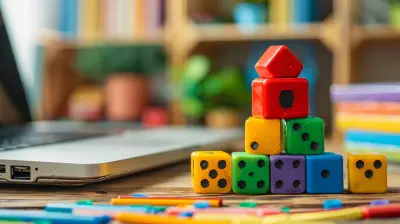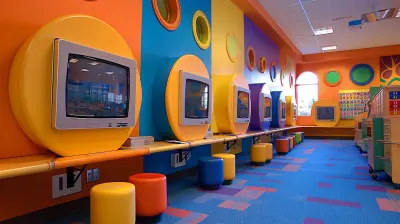The Role of Educational Research in Shaping Classroom Practices
11 February 2025
Education is constantly evolving, and today’s classroom practices are vastly different from what they were just a few decades ago. But have you ever stopped to wonder, how did these changes come about? Who decided that project-based learning is more effective than rote memorization? Or why do teachers emphasize group work and collaboration now more than ever? The answer, my friend, lies in educational research.
Educational research plays a crucial role in shaping the way teachers teach and how students learn. It’s like the backbone of modern education, quietly working behind the scenes to give us insights into what’s working (and what’s not) in classrooms across the world. But how exactly does research influence the day-to-day practices of teachers? And why is it so important? Let’s dive into the world of educational research and uncover its vital role in shaping classroom practices.

What is Educational Research?
At its core, educational research is a systematic process of investigating and analyzing educational strategies, policies, and environments to improve teaching and learning outcomes. Researchers dive into the nitty-gritty of everything from student behavior to instructional methods, all with the aim of finding better ways to educate.Think of it as the scientific method applied to education. Researchers look at questions like, “Does technology really improve student engagement?” or “What’s the best way to teach critical thinking skills?” They collect data, analyze trends, and come up with evidence-based recommendations that can be implemented in real classrooms.
Why Does Educational Research Matter?
You might be thinking, "Okay, great, but why does this matter to me as a teacher, student, or parent?" Well, educational research is the foundation upon which educational policies and best practices are built. Without it, we’d be relying on guesswork or outdated methods to educate the next generation.It’s like trying to drive a car without a map or GPS. Sure, you might get to your destination eventually, but wouldn’t it be much easier if you had solid directions? Educational research gives us those directions—guiding teachers, administrators, and policymakers toward better educational outcomes.

How Educational Research Impacts Classroom Practices
Let’s get into the meat of the topic. How exactly does educational research translate into the real-world classroom environment? The truth is, the impact of research is everywhere, even in the smallest details of your classroom experience.1. Shaping Curriculum Design
One of the most significant ways educational research shapes classroom practices is through curriculum design. Have you noticed how curricula have shifted focus from purely memorizing facts to fostering critical thinking, creativity, and problem-solving? This shift didn’t happen arbitrarily; it was guided by years of research that showed students learn better when they’re actively engaged rather than passively absorbing information.For example, research into constructivist theories of learning—which emphasize that students build their own understanding through experiences—has led to more project-based, hands-on learning in classrooms. Students today are encouraged to ask questions, explore, and engage in discussions rather than sit quietly and absorb information.
2. Teacher Training and Professional Development
No matter how passionate or experienced a teacher is, staying up-to-date with the latest research is essential for continued growth. Educational research directly influences teacher training programs and professional development opportunities. By understanding the latest findings, educators can refine their teaching strategies to meet the needs of their students more effectively.For instance, the concept of “differentiated instruction” has become popular in recent years. Thanks to research, teachers now understand that students learn at different paces and in different ways. As a result, classrooms are more flexible, with teachers adapting lessons to meet the needs of all learners—whether they’re visual, auditory, or kinesthetic learners.
3. Classroom Management Strategies
Here’s where research really impacts the daily grind of teaching. Effective classroom management techniques are often the result of ongoing studies into student behavior, motivation, and engagement. Without research, we wouldn’t know that positive reinforcement works better than punishment in maintaining classroom discipline.Studies have shown that students thrive in environments where they feel respected and valued. This has led to the rise of restorative justice practices and social-emotional learning (SEL) in classrooms. Instead of traditional punitive measures, teachers are now focusing on building relationships, fostering communication, and emphasizing emotional intelligence to create a positive classroom atmosphere.
4. Use of Technology in Education
We live in a digital age, and it seems like every classroom now has some form of technology, whether it’s tablets, interactive whiteboards, or online learning platforms. But how did we get here? Educational research has been instrumental in showing us the benefits (and potential pitfalls) of using technology in the classroom.For example, research has shown that blended learning models—which combine traditional face-to-face teaching with online components—can increase student engagement and improve learning outcomes. As a result, many schools now incorporate digital tools like Google Classroom, Kahoot, and Zoom into their teaching strategies.
However, research also warns us of the potential downsides of technology, such as decreased attention spans or the digital divide between students who have access to technology and those who don’t. This balance is crucial for educators to consider when integrating new tools into their classrooms.
5. Addressing Equity in Education
One of the most important roles of educational research is highlighting and addressing inequalities within the education system. Studies on the achievement gap—the disparity in academic performance between groups of students, often along racial, socioeconomic, or gender lines—have prompted significant changes in how schools approach teaching and learning.Research has shown that factors like implicit bias, lack of access to resources, and even the stereotype threat (the fear of confirming negative stereotypes about one’s group) can negatively impact student performance. As a result, many schools are now implementing culturally responsive teaching practices to create more inclusive and equitable learning environments.
These practices include incorporating diverse perspectives into the curriculum, fostering a growth mindset, and providing targeted support for students who may be at a disadvantage.

Challenges in Applying Educational Research
Of course, while the impact of educational research is undeniable, it’s not without its challenges. Translating research findings into practical, real-world applications can be tricky. After all, classrooms are dynamic environments with hundreds of variables at play. What works in one school may not necessarily work in another.1. The Gap Between Research and Practice
One of the biggest challenges is the research-to-practice gap. That is, even though research may suggest a particular teaching strategy is effective, it may take years (or even decades) before it becomes standard practice in classrooms. This lag can occur for several reasons, including resistance to change, lack of resources, or insufficient teacher training.2. Overgeneralization of Findings
Another challenge is the overgeneralization of research findings. What works for one group of students may not work for another. For example, a study might show that a specific reading strategy is effective, but it may only be effective for students in a particular age group or socioeconomic background. Applying these findings universally can lead to ineffective teaching practices.3. Keeping Up with Rapid Changes
The world of education—and research—is constantly evolving. What was considered best practice ten years ago might be considered outdated today. Staying up-to-date with the latest research can be overwhelming for teachers who already have packed schedules. Professional development programs can help bridge this gap, but more needs to be done to ensure that research findings are accessible and easy to implement.
The Future of Educational Research
So, what does the future hold for educational research? With advances in technology, data collection, and analytics, research is becoming more sophisticated and easier to conduct. New tools like artificial intelligence (AI) and machine learning are being used to analyze vast amounts of educational data, providing deeper insights into student learning behaviors and outcomes.Moreover, as more schools adopt personalized learning models—tailoring education to the individual needs and preferences of each student—research into differentiated instruction and adaptive learning technologies will continue to grow in importance.
A Collaborative Effort
Ultimately, the future of educational research will rely heavily on collaboration between researchers, educators, and policymakers. Teachers, in particular, play a vital role in this process. After all, who better to test and provide feedback on new teaching strategies than the people on the front lines of education?By staying informed and engaged with the latest research, teachers can continue to refine their practices and ensure that every student has the opportunity to succeed.
Conclusion: A Catalyst for Change
In summary, educational research is more than just academic jargon or abstract theories. It’s a powerful tool that influences nearly every aspect of the classroom experience—from curriculum design and teacher training to classroom management and technology integration.Without research, we’d be stuck in the past, using outdated methods that don’t necessarily serve the needs of today’s students. But thanks to ongoing research, education is evolving to become more inclusive, engaging, and effective. Teachers are better equipped than ever to meet the diverse needs of their students, and students are benefiting from more personalized and meaningful learning experiences.
So the next time you wonder why your classroom looks the way it does, remember that there’s a whole world of research behind every decision. And who knows? Maybe the next big educational breakthrough is just around the corner.
all images in this post were generated using AI tools
Category:
Educational ResearchAuthor:

Madeleine Newton
Discussion
rate this article
17 comments
Astraea Middleton
Educational research is like the secret sauce in the classroom recipe—mixing insights and innovation to spice up learning! Let’s stir up some fun while shaping bright minds together!
March 8, 2025 at 12:57 PM

Madeleine Newton
Thank you! I love the analogy of educational research as a secret sauce—it truly enhances our teaching. Together, we can create a richer learning experience for all students!
Morrow McCracken
This article beautifully highlights the profound impact of educational research on classroom practices. It’s inspiring to see how innovative ideas can transform teaching and learning, ultimately enriching the educational experience for students everywhere.
March 4, 2025 at 5:42 AM

Madeleine Newton
Thank you for your thoughtful comment! I'm glad the article resonated with you and highlighted the importance of educational research in enhancing teaching and learning.
Mason Willis
Research or repeat mistakes!
March 2, 2025 at 4:23 AM

Madeleine Newton
Research is essential to avoid repeating mistakes and to enhance effective classroom practices.
Pilar Howard
What a thoughtful article! It’s inspiring to see how educational research can bridge the gap between theory and practice. Engaging with studies can truly transform our classrooms and enhance student experiences. Keep shining a light on this important topic!
February 27, 2025 at 11:57 AM

Madeleine Newton
Thank you for your kind words! I'm glad you found the article inspiring. Engaging with research is indeed crucial for enhancing our classrooms and student experiences!
Leah Reynolds
This article effectively highlights how educational research informs and transforms classroom practices, ensuring that teaching strategies are evidence-based and tailored to meet diverse student needs for optimal learning outcomes.
February 26, 2025 at 7:56 PM

Madeleine Newton
Thank you for your insightful comment! I'm glad to hear that the article resonates with the importance of evidence-based teaching strategies in enhancing student outcomes.
Soryn Vance
This article highlights the vital connection between educational research and classroom practices. I'm intrigued by how evolving research findings can adapt teaching methods and enhance student engagement. Excited to explore more on this topic!
February 23, 2025 at 8:27 PM

Madeleine Newton
Thank you for your engagement! I'm glad you found the connection between research and classroom practices intriguing—it's essential for fostering effective teaching and learning!
Kristy Marks
Educational research illuminates the path to effective teaching, empowering educators to adapt and innovate in the classroom. By integrating findings into practice, we can create dynamic learning environments that inspire both students and teachers. Let’s embrace research as a catalyst for transformative education! Keep pushing boundaries!
February 23, 2025 at 1:48 PM

Madeleine Newton
Thank you for your insightful comment! I fully agree that integrating educational research is essential for fostering innovation and inspiring both educators and students. Let's continue to champion research as a key driver of transformative education!
Olive McLaury
Great insights! Educational research truly transforms classroom practices and enhances student learning experiences. Keep sharing!
February 20, 2025 at 1:18 PM

Madeleine Newton
Thank you! I appreciate your support and enthusiasm for the impact of educational research on teaching and learning.
Murphy White
Educational research plays a crucial role in informing and enhancing classroom practices. It provides evidence-based insights that can lead to improved teaching methods and student outcomes. However, the effectiveness of implementing these findings depends on collaboration between researchers and educators to ensure practical applicability in diverse classroom environments.
February 20, 2025 at 4:19 AM

Madeleine Newton
Thank you for your insight! I completely agree that collaboration between researchers and educators is vital for translating research findings into effective classroom practices. Your emphasis on practical applicability highlights a key aspect of improving education.
Daria Abbott
Great insights on how educational research influences classroom practices! It's inspiring to see how theory transforms teaching for better student outcomes.
February 18, 2025 at 1:46 PM

Madeleine Newton
Thank you! I'm glad you found the insights inspiring and relevant to improving student outcomes. Your feedback motivates further exploration of this important connection!
Max McSweeney
Research transforms theory into impactful teaching—empower educators with evidence.
February 18, 2025 at 5:26 AM

Madeleine Newton
Thank you! I completely agree—evidence-based research is essential for empowering educators and enhancing classroom practices.
Isolde Willis
Educational research empowers teachers to innovate, transform classrooms, and inspire future generations!
February 17, 2025 at 9:17 PM

Madeleine Newton
Absolutely! Educational research is essential for equipping teachers with the tools and insights they need to foster innovation and create inspiring learning environments.
Kendra McNaughton
Research: the secret sauce for smarter classrooms!
February 16, 2025 at 5:40 AM

Madeleine Newton
Absolutely! Research is essential for informing effective teaching strategies and enhancing student learning outcomes in classrooms.
Astrid Riley
This article beautifully highlights the vital connection between educational research and classroom practices. It’s inspiring to see how evidence-based methods can transform learning experiences for both teachers and students alike.
February 15, 2025 at 11:55 AM

Madeleine Newton
Thank you for your kind words! I'm glad you found the connection between educational research and classroom practices inspiring. Your support is greatly appreciated!
Elizabeth Kelly
Educational research is crucial for informing and improving classroom practices, providing evidence-based strategies that enhance teaching effectiveness and student learning outcomes in diverse educational settings.
February 14, 2025 at 7:53 PM

Madeleine Newton
Thank you! I completely agree—educational research is essential for developing effective teaching strategies that cater to diverse student needs and improve learning outcomes.
Zorina Clayton
How does educational research directly influence teachers' methods and student engagement in today's classrooms? Fascinating topic!
February 12, 2025 at 12:24 PM

Madeleine Newton
Educational research provides evidence-based strategies that inform teaching practices, helping teachers adapt their methods to enhance student engagement and learning outcomes effectively.
Mackenzie McKale
Great insights! Research truly empowers effective classroom strategies and practices.
February 11, 2025 at 1:27 PM

Madeleine Newton
Thank you! I'm glad you found the insights valuable. Research is indeed crucial for enhancing our teaching methods.
MORE POSTS

Engaging Ways to Teach Digital Citizenship

The Role of Gamification in Online Education

Spotting Fake News: Tools and Strategies for Critical Thinking

Building a Morning Routine to Jumpstart Your Study Day

Bridging the Gap Between Theory and Practice in Educational Research

Interactive Learning Stations to Energize Your Classroom

The Connection Between Math and Music: A Harmonious Relationship

Critical Thinking and the Scientific Method: A Perfect Pairing

Math in Nature: Discovering Patterns in the World Around Us

The Role of Philanthropy in Filling School Funding Gaps

Strategies for Creating a Mentally Healthy Homework Environment